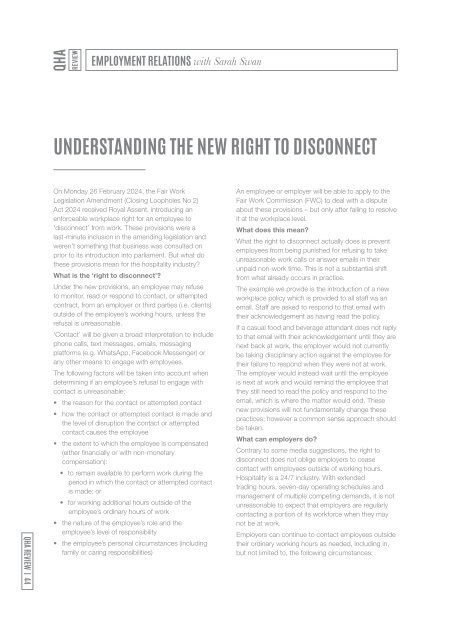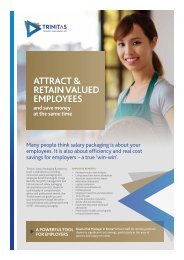QHA-Review_April_Digital
- No tags were found...
Create successful ePaper yourself
Turn your PDF publications into a flip-book with our unique Google optimized e-Paper software.
EMPLOYMENT RELATIONS with Sarah Swan<br />
UNDERSTANDING THE NEW RIGHT TO DISCONNECT<br />
<strong>QHA</strong> REVIEW | 44<br />
On Monday 26 February 2024, the Fair Work<br />
Legislation Amendment (Closing Loopholes No 2)<br />
Act 2024 received Royal Assent, introducing an<br />
enforceable workplace right for an employee to<br />
‘disconnect’ from work. These provisions were a<br />
last-minute inclusion in the amending legislation and<br />
weren’t something that business was consulted on<br />
prior to its introduction into parliament. But what do<br />
these provisions mean for the hospitality industry?<br />
What is the ‘right to disconnect’?<br />
Under the new provisions, an employee may refuse<br />
to monitor, read or respond to contact, or attempted<br />
contract, from an employer or third parties (i.e. clients)<br />
outside of the employee’s working hours, unless the<br />
refusal is unreasonable.<br />
‘Contact’ will be given a broad interpretation to include<br />
phone calls, text messages, emails, messaging<br />
platforms (e.g. WhatsApp, Facebook Messenger) or<br />
any other means to engage with employees.<br />
The following factors will be taken into account when<br />
determining if an employee’s refusal to engage with<br />
contact is unreasonable:<br />
• the reason for the contact or attempted contact<br />
• how the contact or attempted contact is made and<br />
the level of disruption the contact or attempted<br />
contact causes the employee<br />
• the extent to which the employee is compensated<br />
(either financially or with non-monetary<br />
compensation):<br />
• to remain available to perform work during the<br />
period in which the contact or attempted contact<br />
is made; or<br />
• for working additional hours outside of the<br />
employee’s ordinary hours of work<br />
• the nature of the employee’s role and the<br />
employee’s level of responsibility<br />
• the employee’s personal circumstances (including<br />
family or caring responsibilities)<br />
An employee or employer will be able to apply to the<br />
Fair Work Commission (FWC) to deal with a dispute<br />
about these provisions – but only after failing to resolve<br />
it at the workplace level.<br />
What does this mean?<br />
What the right to disconnect actually does is prevent<br />
employees from being punished for refusing to take<br />
unreasonable work calls or answer emails in their<br />
unpaid non-work time. This is not a substantial shift<br />
from what already occurs in practice.<br />
The example we provide is the introduction of a new<br />
workplace policy which is provided to all staff via an<br />
email. Staff are asked to respond to that email with<br />
their acknowledgement as having read the policy.<br />
If a casual food and beverage attendant does not reply<br />
to that email with their acknowledgement until they are<br />
next back at work, the employer would not currently<br />
be taking disciplinary action against the employee for<br />
their failure to respond when they were not at work.<br />
The employer would instead wait until the employee<br />
is next at work and would remind the employee that<br />
they still need to read the policy and respond to the<br />
email, which is where the matter would end. These<br />
new provisions will not fundamentally change these<br />
practices; however a common sense approach should<br />
be taken.<br />
What can employers do?<br />
Contrary to some media suggestions, the right to<br />
disconnect does not oblige employers to cease<br />
contact with employees outside of working hours.<br />
Hospitality is a 24/7 industry. With extended<br />
trading hours, seven-day operating schedules and<br />
management of multiple competing demands, it is not<br />
unreasonable to expect that employers are regularly<br />
contacting a portion of its workforce when they may<br />
not be at work.<br />
Employers can continue to contact employees outside<br />
their ordinary working hours as needed, including in,<br />
but not limited to, the following circumstances:
















